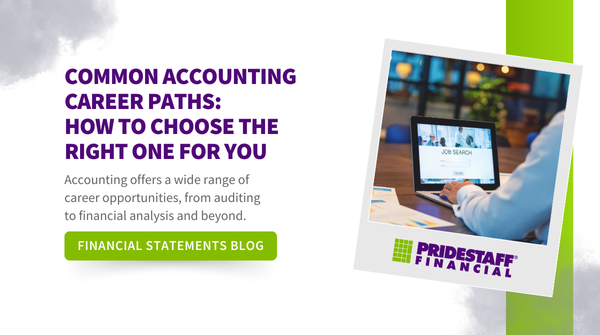Common Accounting Career Paths: How to Choose the Right One for You

Accounting offers a wide range of career opportunities, from auditing to financial analysis and beyond. And recent advances in technology have made careers in accounting more exciting. This blog breaks down the most common career paths in the field, providing insights to help you align your skills and interests with the right role for your professional goals. Now is the perfect time to begin your search with PrideStaff Financial.
Associates degree:
You can get started on getting real-world experience with an associate’s degree. Accounting Clerk: The accounting clerk oversees ensuring that financial records are always updated. This job entails preparing reports and reconciling bank statements. Tax Examiners: Typically work for federal, state, and local governments. They determine how much is owed in taxes by organizations and business entities. Tax examiners review the filed tax returns and evaluate if credits and deductions are compliant with what the law of the state allows. Bookkeeper: With software today that automates accounting processes, bookkeepers are tasked with checking the accuracy of entries and resolving issues that might arise from the automated processes. Since matching is important for reconciling invoices and accounts payables, the bookkeeper ensures that all documents are matched to make accurate payments and financial reports.
Bachelor’s degree:
Having a B.S. degree opens the door to some interesting opportunities. Cost Estimator: They identify the factors affecting costs and at the same time recommend ways to cut costs. Their role is essential to the survival of businesses as they maintain the accuracy of estimates and projections. Budget Analyst: Planning finances, preparing budget reports, and monitoring spending are among the primary duties. Working with program managers, the budget analyst reviews budget proposals and budget requests and prepares a consolidated organizational budget. You can also become a teacher of accounting! Teachers: Work in public or private colleges and universities and specifically teach accounting and accounting-related subjects. Aside from developing instructional plans, they also serve on academic and administrative committees as needed.
Master’s and Ph.D. degrees:
With an upper-level degree, you can do anything from Chief Audit Executive to Financial Analyst. There are even some creative alternatives. Financial Analysts: Monitor and study economics and business to be able to recommend the right investments or collection of investments to clients. Within organizations, they create financial models to support decision-making. You would be required to predict the future performance of companies. Chief Audit Executive: The chief auditor monitors and verifies the accuracy and effectiveness of the internal control system. Responsible for planning all aspects of an organization’s auditing services, the chief auditor keeps a record of all transactions and assets and ensures compliance with appropriate standards. Non-Profit Accountant: These accounting professionals are driven by an extraordinary commitment to serving communities. They help manage the finances of non-profit organizations. Financial Writer: The financial writer is focused on writing about the industry. An understanding of finance and accounting systems is essential to be able to write effective and credible content. Those with an accounting background can easily penetrate this field to write about financial markets, investments, and different accounting standards.
Looking to boost your accounting & finance career?
Connect with PrideStaff Financial–where award-winning job seeker satisfaction is our standard. Visit our job board to explore the latest and greatest job opportunities today.



